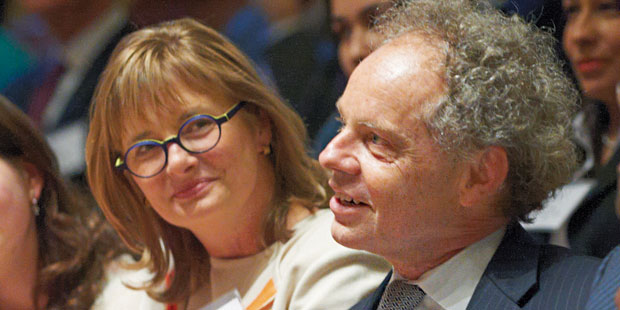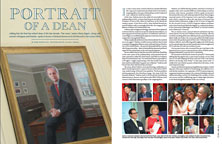Portrait of a Dean
Printer Friendly VersionCalling him the best law school dean of the last decade, “bar none,” Justice Elena Kagan—along with several colleagues and friends—spoke in honor of Richard Revesz as he bid farewell to his corner office.
In early 2008, Kenji Yoshino faced an unusual dilemma: The respected constitutional scholar had in his hands a tempting offer to become a full professor at NYU School of Law—and yet he could not accept it.
At the time, Yoshino was in the midst of a successful visiting professorship at NYU, on leave from his post as Guido Calabresi Professor of Law at Yale, where he had been on the faculty for nearly 10 years. To lure him to NYU, Dean Richard Revesz presented Yoshino with a seemingly ideal title: the inaugural Earl Warren Professor of Constitutional Law.
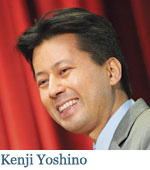 Yoshino, who is of Japanese heritage, was honored but explained to Revesz that he could not accept the chair because Warren, as attorney general and later governor of California, had been a central figure in establishing the Japanese American internment camps there during World War II.
Yoshino, who is of Japanese heritage, was honored but explained to Revesz that he could not accept the chair because Warren, as attorney general and later governor of California, had been a central figure in establishing the Japanese American internment camps there during World War II.
“Ricky completely understood, but a few weeks later he reached out to me again,” Yoshino recalled. Revesz told him that he had consulted a biography of Warren and confirmed that as Chief Justice of the United States—the post he famously held for 16 years after his governorship—Warren had publicly expressed profound regret for his involvement in the internment program.
Revesz added that he had discovered he had some flexibility in the exact name of the professorship, and proposed that the chair instead be called the Chief Justice Earl Warren Professorship of Constitutional Law. “He mentioned that as a specialist in civil rights, I might enjoy having a title that would remind me how much an individual can grow over a lifetime,” Yoshino said. “I knew then that I had found my new dean.”
The story, which Yoshino recounted during a celebration on April 9 honoring Revesz’s 11 years of service at the helm of NYU Law, evoked many of Revesz’s best qualities: “his keen problem-solving approach, his relentless energy—but most of all, his humane wisdom,” Yoshino said to the hundreds of professors, administrators, alumni, and students who filled Tishman Auditorium to bid a bittersweet goodbye to the outgoing dean.
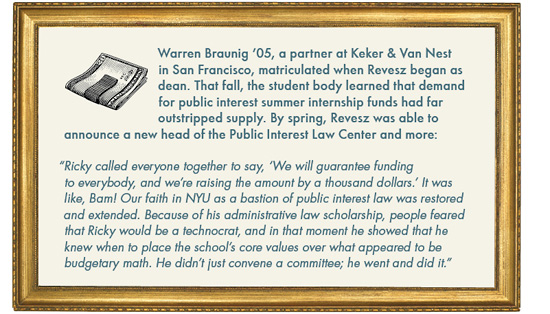 Yoshino, as a fellow faculty member, was last in a lineup of speakers who each revealed different relationships to Revesz as dean: John Sexton, president of NYU, spoke as Revesz’s decanal predecessor and, subsequently, his boss; Elena Kagan, associate justice of the Supreme Court, was both a colleague and a direct competitor when she was dean of Harvard Law School; Robert Katzmann, judge on the US Court of Appeals for the Second Circuit, is both a longtime adjunct professor and a close friend; and Nicholas Bagley ’05, assistant professor at the University of Michigan Law School, is a former student and collaborator of Revesz.
Yoshino, as a fellow faculty member, was last in a lineup of speakers who each revealed different relationships to Revesz as dean: John Sexton, president of NYU, spoke as Revesz’s decanal predecessor and, subsequently, his boss; Elena Kagan, associate justice of the Supreme Court, was both a colleague and a direct competitor when she was dean of Harvard Law School; Robert Katzmann, judge on the US Court of Appeals for the Second Circuit, is both a longtime adjunct professor and a close friend; and Nicholas Bagley ’05, assistant professor at the University of Michigan Law School, is a former student and collaborator of Revesz.
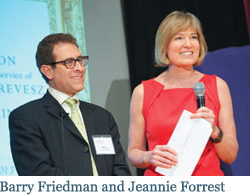 The 90-minute event, emceed with wit and banter by Vice Dean Jeannie Forrest and Professor Barry Friedman, also featured the unveiling of Revesz’s official portrait, painted by Daniel Mark Duffy. But before the scrim was pulled off Duffy’s handsome work, the speakers painted their own “verbal portrait,” as Yoshino called it, each reflecting with insight and a little humor on the myriad ways Revesz had transformed and strengthened NYU Law since he took over as dean in 2002.
The 90-minute event, emceed with wit and banter by Vice Dean Jeannie Forrest and Professor Barry Friedman, also featured the unveiling of Revesz’s official portrait, painted by Daniel Mark Duffy. But before the scrim was pulled off Duffy’s handsome work, the speakers painted their own “verbal portrait,” as Yoshino called it, each reflecting with insight and a little humor on the myriad ways Revesz had transformed and strengthened NYU Law since he took over as dean in 2002.
First up was Sexton, who recounted his 1984 trip down to the Supreme Court to try to convince Revesz, then a clerk for Justice Thurgood Marshall, to join the NYU Law faculty.
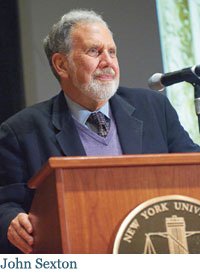 “He elevated our faculty the minute he joined it,” Sexton said, adding that during his own 14-year tenure as dean, no one “had more to do with shaping the heart and soul of the Law School, which is its faculty, than Ricky.” In this way, Sexton said, “it really is the case that for 25 years, Ricky’s been the dean, in the most important way.”
“He elevated our faculty the minute he joined it,” Sexton said, adding that during his own 14-year tenure as dean, no one “had more to do with shaping the heart and soul of the Law School, which is its faculty, than Ricky.” In this way, Sexton said, “it really is the case that for 25 years, Ricky’s been the dean, in the most important way.”
Sexton cited Revesz’s many accomplishments as dean, including more than $500 million in fundraising, the addition of 46 new faculty members, the expansion of NYU’s pioneering loan repayment assistance program, the creation of multiple new and influential policy centers, the doubling of the number of clinical courses, and the trailblazing steps to adapt legal education to the fiscal and global realities of the 21st century.
But the outsized success of Revesz’s tenure was by no means preordained. To the contrary, remembered Kagan, Revesz “flunked the first test of deaning…which is, you have to pick your predecessor really well.”
Noting that Revesz assumed the job in the shadows of the extremely popular Sexton, Kagan, who became dean of Harvard Law School in 2003, recalled that “there were some number of people who said, ‘Well, he’s not John Sexton, is he?’” But, she added, “Ricky proved in really short order that you didn’t necessarily have to have the personality type of John to be just an extraordinarily successful dean.”
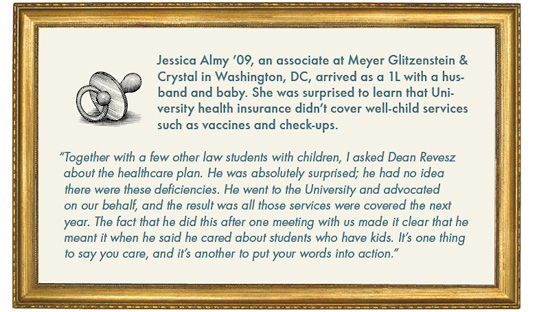 Kagan recounted with rueful amusement the frequent battles she and Revesz engaged in over faculty hiring. “It just turned out that a few choice moments from… every time I decided I wanted a faculty member, there was Ricky Revesz! We seemed to have quite the same taste,” Kagan said, remarking that when she heard people mention 46 new faculty at NYU, she felt “as though I was there for every single one of those.”
Kagan recounted with rueful amusement the frequent battles she and Revesz engaged in over faculty hiring. “It just turned out that a few choice moments from… every time I decided I wanted a faculty member, there was Ricky Revesz! We seemed to have quite the same taste,” Kagan said, remarking that when she heard people mention 46 new faculty at NYU, she felt “as though I was there for every single one of those.”
As the crowd roared with laughter, Kagan added with a smile, “I have to say, this was all highly annoying.”
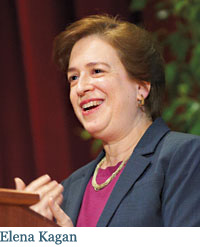 But Kagan made it clear that any annoyance was dwarfed by her respect for and admiration of her New York counterpart. Calling him the best dean in the business over the past 11 years—“bar none”—Kagan said that when she looked outside Harvard for ideas on how to improve legal education, “there was no one I looked to more than Ricky Revesz and no school I looked to more than I looked to NYU.”
But Kagan made it clear that any annoyance was dwarfed by her respect for and admiration of her New York counterpart. Calling him the best dean in the business over the past 11 years—“bar none”—Kagan said that when she looked outside Harvard for ideas on how to improve legal education, “there was no one I looked to more than Ricky Revesz and no school I looked to more than I looked to NYU.”
As an example of the model Revesz set for other deans, Kagan highlighted his commitment to public service and public interest law, primarily through his championing of the Root-Tilden-Kern Scholarship Program, his support of the loan repayment assistance program, and his protection of the summer funding provided by the Public Interest Law Center.
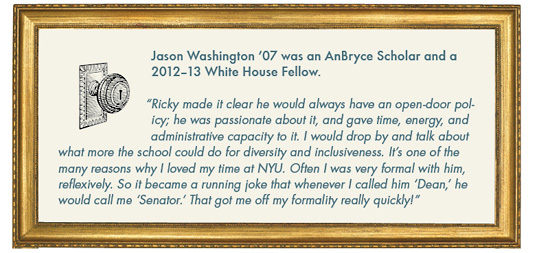 Yet Revesz’s “true greatness,” Kagan said, resides in his values. NYU Law “is an entrepreneurial, innovative, optimistic place,” she said. “And law schools don’t have to be that. Law schools can be—and often are—stodgy and tradition-bound and not the most adventurous institutions in the world.” But Revesz “imbued this place with his optimism, with his sense of adventure and innovation.”
Yet Revesz’s “true greatness,” Kagan said, resides in his values. NYU Law “is an entrepreneurial, innovative, optimistic place,” she said. “And law schools don’t have to be that. Law schools can be—and often are—stodgy and tradition-bound and not the most adventurous institutions in the world.” But Revesz “imbued this place with his optimism, with his sense of adventure and innovation.”
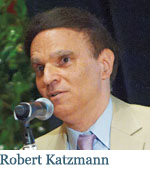 Following Kagan, Katzmann spoke admiringly of Revesz’s ability to maintain a high level of scholarly output even as he bore the burdens of running a top-tier law school. “Usually when somebody becomes a dean, the sense is he or she is done with scholarship and is going to become an administrator,” Katzmann said, but Revesz took “active efforts to promote the careers of the young talent around him.”
Following Kagan, Katzmann spoke admiringly of Revesz’s ability to maintain a high level of scholarly output even as he bore the burdens of running a top-tier law school. “Usually when somebody becomes a dean, the sense is he or she is done with scholarship and is going to become an administrator,” Katzmann said, but Revesz took “active efforts to promote the careers of the young talent around him.”
Katzmann also echoed the near-universal observation that Revesz personally responded to e-mails deep into the night, saying that it instilled in everyone else a sense not just of awe but also of mutual obligation: “We want to say yes to Ricky, because we know that he would say yes to us if he possibly could.”
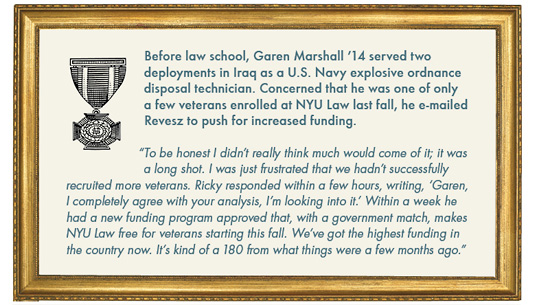 One person Revesz said yes to many times was next on the podium: Nicholas Bagley, who told the audience that as a first-year student in 2002, all he knew of Revesz was “that he didn’t hug people as much as John Sexton did.”
One person Revesz said yes to many times was next on the podium: Nicholas Bagley, who told the audience that as a first-year student in 2002, all he knew of Revesz was “that he didn’t hug people as much as John Sexton did.”
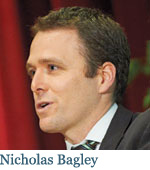 In Bagley’s second year, however, Revesz tapped him to help edit a textbook chapter on the law and economics of environmental regulation. Bagley was wary, because he had not studied economics since high school, but “Ricky insisted it would be fine,” he said. “And some part of me—some big part of me—wanted to believe him.” Meanwhile, Bagley said, the rest of him thought, “This man is clearly out of his mind!”
In Bagley’s second year, however, Revesz tapped him to help edit a textbook chapter on the law and economics of environmental regulation. Bagley was wary, because he had not studied economics since high school, but “Ricky insisted it would be fine,” he said. “And some part of me—some big part of me—wanted to believe him.” Meanwhile, Bagley said, the rest of him thought, “This man is clearly out of his mind!”
The following year, Revesz asked Bagley to co-author an article—one of the first in a series of Revesz’s collaborations with students while he was dean. Again, Bagley was concerned that he couldn’t live up to the dean’s expectations. But Revesz’s persistence won out, and the resulting article, “Centralized Oversight of the Regulatory State,” ran in the Columbia Law Review and won a 2006 American Bar Association award for best article in its field.
Bagley, who still sounded astonished eight years on, said he initially thought Revesz’s optimism and faith in a student was misplaced, possibly even “reckless.” But because Revesz “couples that optimism with a huge investment of his own time and energy,” Bagley said, it “turns out to be a subtle but effective way to get the people around him to step it up a notch, to be better than they think they are.”
Anthony Welters ’77, chairman of the Law School’s board of trustees, was tasked with the official presentation of Revesz’s portrait, but first he took an opportunity to thank not just the dean but also his family.
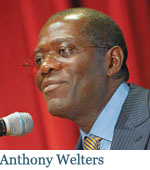 “It’s easy to focus on the accomplishments that are visible to everyone,” Welters said. “It’s a little harder to recognize the sacrifices that people must make to achieve that level of success.” Gesturing to Revesz’s wife, Professor Vicki Been ’83, and their daughter, Sarah (their son, Joshua, was unable to attend the celebration), Welters said, “We owe you a debt of gratitude for sharing your father and your husband with us.”
“It’s easy to focus on the accomplishments that are visible to everyone,” Welters said. “It’s a little harder to recognize the sacrifices that people must make to achieve that level of success.” Gesturing to Revesz’s wife, Professor Vicki Been ’83, and their daughter, Sarah (their son, Joshua, was unable to attend the celebration), Welters said, “We owe you a debt of gratitude for sharing your father and your husband with us.”
When the man of the hour finally took the stage beside his portrait, he appeared to be overwhelmed by the affection and accolades that had been showered on him. After thanking each of the speakers individually, Revesz took Welters’s cue and turned to his family.
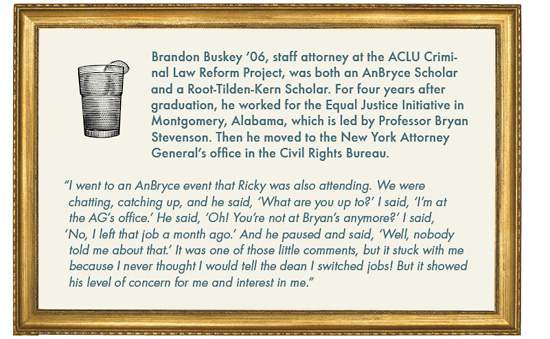 “As much as I enjoyed this job, I enjoyed being with Joshua and Sarah even more,” he said. “Our trips together and family board games, my bike rides and chocolate-chopping sessions with Sarah, my ongoing political discussions and chess games with Joshua—that’s what makes life special.”
“As much as I enjoyed this job, I enjoyed being with Joshua and Sarah even more,” he said. “Our trips together and family board games, my bike rides and chocolate-chopping sessions with Sarah, my ongoing political discussions and chess games with Joshua—that’s what makes life special.”
Then Revesz pointed to the front row to acknowledge his “indefatigable mother,” Nora Revesz. He remembered his childhood in Argentina and his dream of studying in the United States and thanked his mother, who now lives in New York City, for helping him to realize it. “I would definitely not be here had it not been for her,” he said, and the audience laughed at the double entendre.
By the end of the evening, incoming dean Trevor Morrison, who had been appointed just days earlier and was sitting a few rows from the stage, could be forgiven for feeling a bit daunted by the challenge he’d accepted. As Kagan admonished him in her closing remarks, “Trevor, you too have flunked the first test of deanship, which is not to succeed a legend.”
—Jesse Wegman ’05 is a member of the New York Times editorial board, where he writes editorials on the Supreme Court and legal affairs.
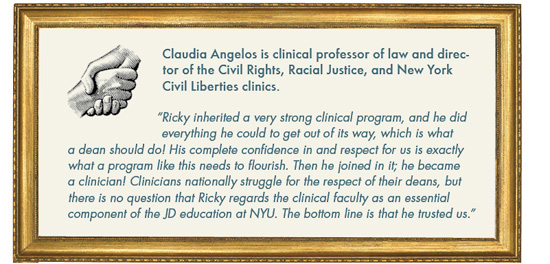
—
